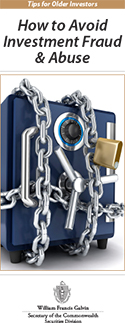Avoid Investment Fraud and Abuse
Download the brochure (PDF)
 Investment con artists frequently target senior investors, cheating them out of savings, insurance proceeds, and even real estate equity.
Investment con artists frequently target senior investors, cheating them out of savings, insurance proceeds, and even real estate equity.
Use these warning signs, provided by the North American Securities Administrators Association, Inc. (NASAA), to protect yourself and your investments.
Save Good Manners for Friends and Family
It’s good to be courteous to others, even if you don’t know them. But swindlers know that many senior citizens are eager to have someone to talk to, even a complete stranger. They might call you (or visit your home) and use your good nature to push a scam.
Some swindlers can combine professional-sounding sales pitches with extremely polite manners, knowing that many older Americans are likely to equate good manners with personal integrity.
If you answer a call (or answer the door) with a stranger asking for money, end the conversation quickly. Even if they seemed nice or polite. Don’t apologize, just hang up or close the door. It’s not a sign of poor manners – you’re just protecting yourself.
Take Time to Make Decisions
If any adviser presses you to make an immediate decision, just say no. Even if the offer is legitimate, you deserve time to review the adviser, the firm, and the investment.
- Check with the Securities Division for information. Almost all investment opportunities must be registered for sale in Massachusetts. Our office can tell you if the investment opportunity is properly registered.
- Get written information about the investment opportunity, review it carefully, and make sure you understand all the risks involved.
Maintain Control of Your Money
Investing requires constant vigilance. Swindlers will claim that they can assume that effort on your behalf. Don’t give complete control of your nest egg to anyone – and educate yourself (or a trusted family member or professional) on the world of investments.
Don’t Give in to Fear
Fear can cloud your good judgment, leaving you in worse financial condition. Swindlers know this, so they prey on fears of lost savings or catastrophic events (such as costly hospital visits).
Swindlers pitch their schemes to address these fears, but they don’t actually match your financial goals. Any worthwhile investment meets your goals with acceptable amounts of risk. Review any potential investment thoroughly, and don’t make hasty decisions based on fear.
Seek Advice from Trusted People
If you don’t have much experience managing money, seek advice from family members or trusted professionals before accepting any investments.
Swindlers often prey upon investors with limited financial management experience. Senior investors — especially those who relied on family members for assistance — are frequent targets.
This is especially common with large windfall payments, such as insurance payments from spousal deaths.
Always Ask Questions
Investment isn’t a hands-off experience. Even if your adviser manages your portfolio, you should still ask questions and review for errors or discrepancies.
- Demand regular written and oral statements from your adviser.
- Review for signs of excessive or unauthorized trading. If you find any, don’t accept assurances that such practices are routine or in your best interest.
- If you don’t get a satisfactory explanation, contact the Securities Division and make a complaint.
Watch for Delays (or excuses) When Cashing Out
If you rely on investment returns to supplement your income, you should expect to receive withdrawn funds within a reasonable timeframe.
Swindlers stall or make excuses when you try to withdraw funds, claiming that the returns aren’t readily accessible. In reality, they’re pocketing the funds for themselves, and might pressure you to “roll over” nonexistent “profits” into new investments.
You deserve to get your money. Don’t let anyone claim otherwise.
Report Any Investment Fraud or Abuse
Falling victim to an investment scam can be embarrassing. But it’s not your fault. Don’t let fear or embarrassment stop you from reporting the fraud.
Swindlers prey on senior investor fears, especially when investors worry about forced institutionalization in a nursing home or other facility. They count on these fears to prevent or delay fraud reporting.
While you might not retrieve all of the stolen money, you could recover some of it by reporting the fraud to local authorities. It’s better to report and reclaim some lost funds than ignore it and lose the money forever.
Beware of "Reload" Scams
If you’ve been victimized before, you’re unfortunately a big target for “reload” scams. These scams target investors with claims to recover the lost funds from prior scams.
It’s an understandable desire to recover lost financial ground, but don’t jump at a chance to quickly reclaim your lost funds. You might end up losing even more in the second scam.
The Securities Division can help you research investments, evaluate investors, and file fraud reports. Contact our office online or by phone at 617-727-3548 or 800-269-5428.